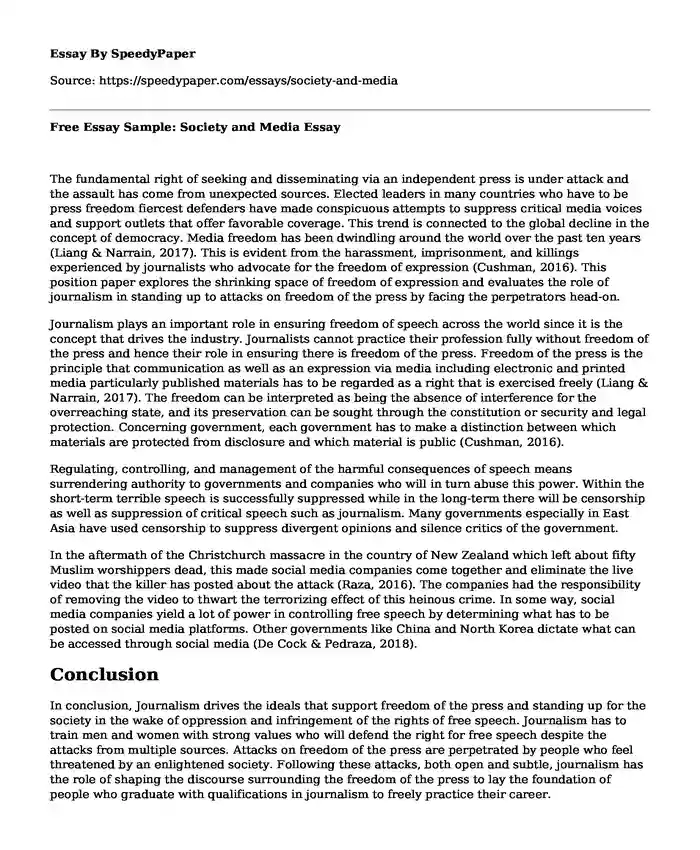
| Type of paper: | Essay |
| Categories: | Censorship Media Society Social issue |
| Pages: | 3 |
| Wordcount: | 692 words |
The fundamental right of seeking and disseminating via an independent press is under attack and the assault has come from unexpected sources. Elected leaders in many countries who have to be press freedom fiercest defenders have made conspicuous attempts to suppress critical media voices and support outlets that offer favorable coverage. This trend is connected to the global decline in the concept of democracy. Media freedom has been dwindling around the world over the past ten years (Liang & Narrain, 2017). This is evident from the harassment, imprisonment, and killings experienced by journalists who advocate for the freedom of expression (Cushman, 2016). This position paper explores the shrinking space of freedom of expression and evaluates the role of journalism in standing up to attacks on freedom of the press by facing the perpetrators head-on.
Journalism plays an important role in ensuring freedom of speech across the world since it is the concept that drives the industry. Journalists cannot practice their profession fully without freedom of the press and hence their role in ensuring there is freedom of the press. Freedom of the press is the principle that communication as well as an expression via media including electronic and printed media particularly published materials has to be regarded as a right that is exercised freely (Liang & Narrain, 2017). The freedom can be interpreted as being the absence of interference for the overreaching state, and its preservation can be sought through the constitution or security and legal protection. Concerning government, each government has to make a distinction between which materials are protected from disclosure and which material is public (Cushman, 2016).
Regulating, controlling, and management of the harmful consequences of speech means surrendering authority to governments and companies who will in turn abuse this power. Within the short-term terrible speech is successfully suppressed while in the long-term there will be censorship as well as suppression of critical speech such as journalism. Many governments especially in East Asia have used censorship to suppress divergent opinions and silence critics of the government.
In the aftermath of the Christchurch massacre in the country of New Zealand which left about fifty Muslim worshippers dead, this made social media companies come together and eliminate the live video that the killer has posted about the attack (Raza, 2016). The companies had the responsibility of removing the video to thwart the terrorizing effect of this heinous crime. In some way, social media companies yield a lot of power in controlling free speech by determining what has to be posted on social media platforms. Other governments like China and North Korea dictate what can be accessed through social media (De Cock & Pedraza, 2018).
Conclusion
In conclusion, Journalism drives the ideals that support freedom of the press and standing up for the society in the wake of oppression and infringement of the rights of free speech. Journalism has to train men and women with strong values who will defend the right for free speech despite the attacks from multiple sources. Attacks on freedom of the press are perpetrated by people who feel threatened by an enlightened society. Following these attacks, both open and subtle, journalism has the role of shaping the discourse surrounding the freedom of the press to lay the foundation of people who graduate with qualifications in journalism to freely practice their career.
References
Cushman, T. (2016). The Fate of Freedom of Expression in Liberal Democracies. Society, 53(4), 348-351. https://www.deepdyve.com/lp/springer-journals/the-fate-of-freedom-of-expression-in-liberal-democracies-ScBphfdZ8F
De Cock, B., & Pedraza, A. P. (2018). From expressing solidarity to mocking on Twitter: Pragmatic functions of hashtags starting with# jesuis across languages. Language in Society, 47(2), 197-217. https://dial.uclouvain.be/pr/boreal/object/boreal:191480
Liang, L., & Narrain, S. (2017). Protest and the Right to Freedom of Speech and Expression. Journal of Public Affairs and Changes. http://www.oas.org/en/iachr/expression/publications/Protesta/ProtestHumanRights.pdf
Raza, A. (2016). ‘Freedom of Speech and Expression’ as a Fundamental Right in India and the Test of Constitutional Regulations: The Constitutional Perspective. Indian Bar Review, 43(2), 87-110. https://www.researchgate.net/publication/306899769_'Freedom_of_Speech_and_Expression'_as_a_Fundamental_Right_in_India_and_the_Test_of_Constitutional_Regulations_The_Constitutional_Perspective
Cite this page
Free Essay Sample: Society and Media. (2023, Aug 28). Retrieved from https://speedypaper.com/essays/society-and-media
Request Removal
If you are the original author of this essay and no longer wish to have it published on the SpeedyPaper website, please click below to request its removal:
- Should Muslims in America Be Considered Terroristsy: Essay Sample
- Free Essay Example on the Critical Class Room
- Free Essay Sample: Status of Women and Divorce in Iran
- Paper Example. Fannie Lou Hamer
- Essay Sample on Comparing Cultural Perspectives on Diversity and Inclusion
- Literary Analysis Essay on Recitatif
- Community Involvement and Engagement in Ending Women's Sexual Violence - Free Paper Example
Popular categories




